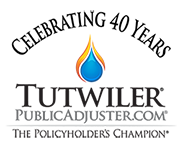Confidentiality settlement requirements are often demanded in the property insurance adjustment process. What happens when you run afoul months or years later as a result of a conflict with some disclosure requirements that overlap the prior agreement? Anybody have any thoughts or answers to this possible fatal conundrum?
A recent sinkhole case before a federal judge in Tampa that received extensive media coverage got me thinking about this issue since we have seen a number of insurance companies and their attorneys demand confidentiality agreements when they do not want the general public, folks in the trade, or the news media to know how much money was paid to a policyholder for a claim that may have (at least in their minds) questionable fact issues on coverage, scope, or damages.
In the recent sinkhole case it was reported that a prior owner received a settlement for a sinkhole but instead of fixing the problem, pocketed the money and then sold the house to a family who apparently were unaware of the prior claim or the sinkhole under the house. Sometime after the closing, the new owners found out about the sinkhole and the fact that it was not fixed. This case was somewhat unique in that criminal charges were brought against the former owners. Based on media reports, the federal judge levied a hefty fine and restitution requirement also placing the former owner on probation with house arrest. As I recall, the federal judge said his decision was very close as to whether the defendants would serve time in prison or house arrest.
Just so it’s clear, I only know what was reported in the public domain and have no inside information on the evidence or if the sellers of the property signed a confidentiality agreement when offered an insurance settlement for their sinkhole claim from their prior insurance carrier.
What I do know is that we had a client contact our office a few years ago following a very large fire that caused extensive damage to the family’s home and personal property. After being retained by our client, things were moving along well with the adjuster from the insurance carrier when suddenly a chill came over the conversations. The insurance company subsequently lawyered up and the company adjuster said the carrier had found some problems on our client’s initial application for insurance coverage with his current carrier, the one the fire loss was reported to. A number of conversations followed which revealed that when the insurance application was filled out, our client did not check the box about any prior insurance losses.
It seems that our client had filed a claim for sinkhole damages unbeknownst to us some time in the past with his old carrier and a settlement was reached on a compromise basis. The sinkhole settlement offer came with a requirement that a confidentiality clause had to be added to the release. So this was exactly what our client did. They signed a release which contained a confidentiality agreement. Not surprisingly, the sinkhole carrier would not renew the policy after they paid the agreed amount and our client then sought new coverage in the marketplace.
Subsequently, a new carrier was signed to insure the home with an all-risk policy. But first an insurance application had to be completed, part of which had a section about any prior loss history. Mindful of the confidentiality agreement they previously signed, the property owner checked the box stating no prior losses.
After processing the application and seeing no loss history, a new policy was issued. Sometime later a fire occurred and a claim for the damages was sent into the new carrier. As is standard procedure, the new carrier submitted an inquiry to a central index bureau most carriers use to see if other claims had been filed by this insured or at the property location. Yep, you guessed it. The old sinkhole claim was on record and was duly reported back to the current carrier.
Then as a general business practice for most insurance companies, the original insurance application was pulled by the claim folks and they quickly connected the dots. A loss had occurred but was not reported on the application. Of course, the carrier on the fire loss denied coverage since there was a material misrepresentation on the application due to the policyholder not disclosing the prior sinkhole loss.
While this may seem harsh and certainly a questionable business practice (after all the carrier could have used their indexing ability to check for prior losses before issuing a policy), they maintained their position of no coverage due to a material misrepresentation on the insurance policy application.
So what are the take-aways from this sad but true story? First, remember that an insurance application is a very important document. You should thoroughly read it and ask questions about any part that you do not understand. Don’t let the agent, broker or office staff sign your application for you and when you do sign it, demand a copy of it for your records. If you are presented with a situation where an insurance carrier is offering you a settlement but it comes with a requirement that you sign a confidentiality agreement, you should have a very clear understanding about how far and to whom this agreement applies and for how long in time it applies.
Confidentiality agreements will almost always go hand-in-hand with a settlement release and if presented with either a release and/or a confidentiality agreement, you would be well advised to ask a lot of questions and consult with a disinterested party that you trust. A lawyer with skills in this area of the law that knows the issues that you may later run afoul of could be a good investment.
While that check for the settlement of a contested claim may look and sound good, think about the possible unintended consequences. It is absolutely critical that you are fully educated on the full ramifications of your signature on any insurance documents.
If you have questions regarding any property insurance claim related issues please call 800.321.4488 or contact us to submit a question to one of our public adjuster insurance claim experts.

